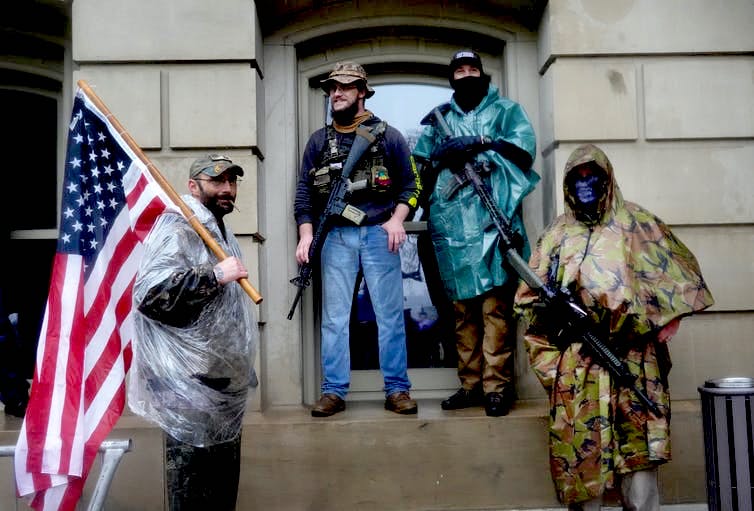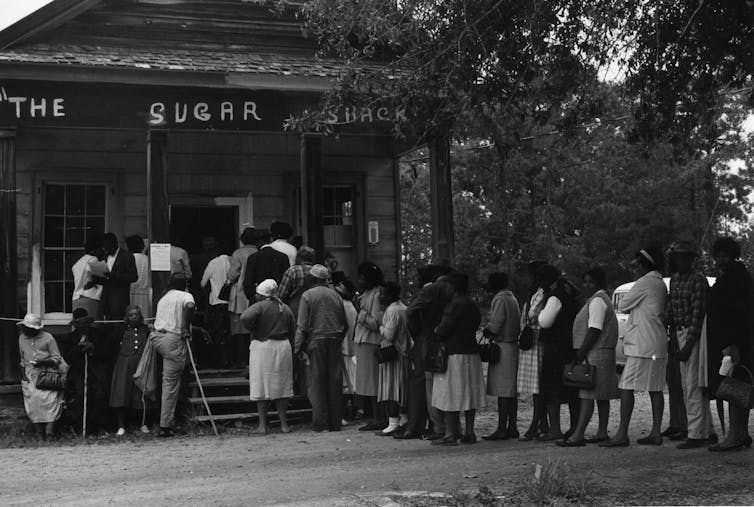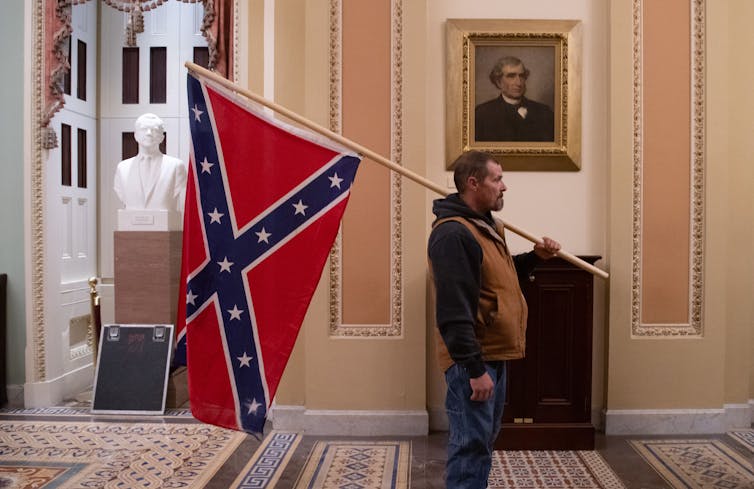Despite the tradition of presenting itself as exceptional, the country looks a lot like the other struggling democracies, writes Alasdair S. Roberts.

(Scott Olson/Getty Images)
By Alasdair S. Roberts
University of Massachusetts Amherst
 For many people, the lesson from the assault on the U.S. Capitol on Jan. 6, 2021 – and more broadly from the experience of the last four years – is that American democracy has become newly and dangerously fragile.
For many people, the lesson from the assault on the U.S. Capitol on Jan. 6, 2021 – and more broadly from the experience of the last four years – is that American democracy has become newly and dangerously fragile.
That conclusion is overstated. In fact, American democracy has always been fragile. And it might be more precise to diagnose the United States as a fragile union rather than a fragile democracy. As President Joe Biden said in his inaugural address, national unity is “that most elusive of things.”
Certainly, faith in American democracy has been battered over the last year. Polls show that 1 in 4 Americans do not recognize Joe Biden as the legitimate winner of the 2020 election. The turn to violence on Capitol Hill was a disturbing attack on an important symbol of U.S. democracy.
But there are four other factors that should be considered to evaluate the true state of the nation. Taking these into account, what emerges is a picture of a country that, despite its long tradition of presenting itself as exceptional, looks a lot like the other struggling democracies of the world.
Democratic Fragility Not New
First, fragility is not really new. It’s misleading to describe the United States as “the world’s oldest democracy,” as many observers have recently done. By modern definitions of the concept, the United States has only been a democracy for about 60 years. Despite constitutional guarantees, most Black Americans could not vote in important elections before the 1960s, nor did they have basic civil rights. Like many other countries, the United States is still working to consolidate democratic ideals.

(MPI/Getty images)
Similarly, the struggle to contain political violence is not new. Washington has certainly seen its share of such violence. Since 1950, there have been multiple bombings and shootings at the U.S. Capitol and the White House. Troops have been deployed to keep order in Washington four times since World War I – during riots and unrest in 1919 and 1968, economic protests in 1932, and again in 2021. The route from the Capitol to the White House passes near the spots where Abraham Lincoln was assassinated in 1865, James Garfield was fatally shot in 1881, and Harry Truman was attacked in 1950.
Political instability is also a familiar feature of economic downturns. There were similar fears about the end of democracy during the 1970s, when the United States wrestled with inflation and unemployment, and during the Great Depression of the 1930s. Of course, those fears had some justification. Many people wondered whether democratic governments could rise to new challenges. But there is evidence from historical episodes like this that democracies do eventually adapt – indeed, that they are better at adapting than non-democratic systems like the Soviet Union, which collapsed in 1991.
Finally, the debate about American democracy is fixated excessively on politics at the national level. This fixation has been aggravated by the way that the media and internet have developed over the last 30 years. Political debate focuses more and more heavily on Washington. But the American political system also includes 50 state governments and 90,000 local governments. More than half a million people in the United States occupy a popularly elected office. Democratic practices may be imperfect, but they are extensive and not easily undone.
On balance, claims about the fragility of American democracy should be taken seriously, but with a sense of proportion. Events since the November 2020 election have been troubling, but they do not signal an impending collapse of America’s democratic experiment.
Crisis of Unity
It might be more useful to think of the present crisis in other terms. The real difficulty confronting the country might be a fragile national union, rather than a fragile democracy.
Since the 1990s, the country has seen the emergence of deep fissures between what came to be called “red” and “blue” America – two camps with very different views about national priorities and the role of federal government in particular. The result has been increasing rancor and gridlock in Washington.

(Saul Loeb/AFP via Getty Images)
Again, this sort of division is not new to American politics. “The United States” did not become established in American speech as a singular rather than a plural noun until after the Civil War. Until the 1950s, it was commonplace to describe the United States as a composite of sections – North, South and West – with distinctive interests and cultures.
In 1932, Pulitzer Prize-winning historian Frederick Jackson Turner compared the United States to Europe, describing it as a “federation of nations” held together through careful diplomacy.
It was only in the 1960s that this view of the United States faded away. Advances in transportation and communications seemed to forge the country into a single economic and cultural unit.
But politicians overestimated this transformation.
Return of Old Divisions
Since the 1990s, old divisions have re-emerged.
America’s current political class has not fully absorbed this reality. Too often, it has taken unity for granted, forgetting the country’s long history of sectional conflict. Because they took unity for granted, many new presidents in the modern era were tempted to launch their administrations with ambitious programs that galvanized followers while antagonizing opponents. However, this winner-take-all style may not be well suited to the needs of the present moment. It may aggravate divisions rather than rebuilding unity.
Only 20 years ago, many Americans – buoyed by an economic boom and the collapse of the Soviet Union – were convinced that their model of governance was on the brink of conquering the world. President George W. Bush declared American-style democracy to be the “single sustainable model for national success.” By contrast, many people today worry that this model is on the brink of collapse.
The hubris of the early 2000s was misguided, and so is the despair of 2021. Like many other countries, the United States is engaged in a never-ending effort to maintain unity, contain political violence and live up to democratic principles.![]()
Alasdair S. Roberts is director of the School of Public Policy at the University of Massachusetts Amherst.
This article is republished from The Conversation under a Creative Commons license. Read the original article.
The views expressed are solely those of the author and may or may not reflect those of Consortium News.



What democracy indeed!! A single, corporate-capitalist-imperialist plutocratic ruling elite and military industrial ruling elites controlled via a Single party with Two Heads (Janus style)???? Really? – with a population our size??
A democracy originally based on exactly the same system as the British one: Only those Males (low melanin types, of course) 21 and older who owned property of a certain taxable rate were permitted to vote….
And while the author mentions the despicable prevention and denial of African American votes, females were also denied it until post WWI and when did the Indigenous Peoples of this land attain the vote, hhmm?
It has never been a democracy and definitely not one (actually no modern one is) akin to the original Athenian one…
The US was never intended by the “Founding Fathers” to be a democracy. There have been powerful democratic movements which have somewhat modified the oligarchy set up by the constitutional congress in 1787. The Civil Rights movement of the 50s to 70s was perhaps the most important.
But I do think this author is correct in calling the US a fragile union. I’m of the belief that Lincoln started the Civil War in order to preserve the union, slavery was not really an issue at all in the beginning. In my view, the Civil War was a mistake because it converted a fragile union into one enforced by means of the full force of the US military. I would have been better for democracy and for people of the US to let the south go. Slave rebellions would have ended slavery in another decade anyway.
I think the US should break up now. Texas needs to revert to a Republic as it has a right to do. Native American lands are already independent nations and they should declare themselves fully independent and apply to nationhood at the UN. California and the western states should just leave the Union.
If there were no union, there would be no monstrous US military, no FBI, no CIA, and no wars in about 80 nations around the earth. The Union is a criminal state. It is a vile empire, no doubt the worst the world has ever seen. It needs to go. All peoples of the earth will be better when the US breaks up into many separate nations.
Now is a good time to push the fragility of the union to its breaking point. The Washington Regime is hopelessly corrupt and antithetical to the interests of people. It needs to go. All of Washington can be turned into a great amusement park and research library where scholars from future generations can plow through the records and debris of empire.
Every time I hear someone refer to “our democracy” I think of the oligarchic plutocracy– albeit with some democratic forms– that rules the country.
Yup, sure enough, well , maybe not so much, oh hell no!
With all due respect Mr. Roberts, I agree we all have opinions on various issues and this one of yours doesn’t ring true to the country I’ve lived in for the last 72 years. Due maybe to a lack of other significant history this comes off as milque-toast when compared to the vicious underbelly environs of D.C. since the 1930’s.
CIA was created in 1947 and in 16 years would be involved in the assassination of a U.S. president. Even former president Harry S. Truman knew damned well what had happened. The same people pulled the wool over his eyes too. His opinion was published as a letter, search it you’ll find it.
We have not had sovereign government since the CIA was created, the same CIA that was involved with an executive action resulting in the murder of JFK. If the U.S. had been a democracy up till then afterwards that was over.
On November 22, 1963 the United States was savaged. I maintain the ever since this message was sent to all of congress that body has never been the same. And the Warren Commission per CIA was a other warning to a congress that didn’t have a stomach for a fight at that time.
But my opinion is likely to not ring true to you, the only difference is that I’ve been here longer.
The late 1960’s was the beginning of the end of heavy industry in the U.S.. The labor movement was beginning to show signs of corruption having enjoyed their success a little too much. That would be the their leadership of course. Labor has been going down hill ever sinces.
The late seventies contrived gas shortages and 1981 Reagan Bush & the neo-cons – wolfawits, cheney , rumsfeld and the 1% move in for the kill.
Then Trump. No Sir, not on your life things are not okay.
Thanks CN
An interesting contrast between the views of the author and those commenting on his article. I am in agreement with many of the remarks in the comment section. There is indeed a fragility of democracy especially among democracies that fail to adhere to the rules of the rule based order. There is a sense that the empire’s many horrors previously exported abroad have now found there way home. A view I share with Otness, Maddden , and most of the others.
In fact, China has been a democracy longer than than we have, since Mao established universal voting rights on a one man, one vote basis in 1951 (having passed the Equal Rights Bill a year earlier).
The three leading democracies–Switzerland, China, and Singapore–are all non-Athenian and each has a unique way of implementing the dictatorship of the proletariat.
Switzerland uses expensive, time-consuming direct democracy. A a 37-year-old from the city of Zurich who turned 18 in year 2000, has, in past 20 years, had the opportunity to take part in 548 referenda, 181 of them being on the federal, 176 on the cantonal and 191 on the municipal level. With the average turnout of 45% it means that they have voted in approximately 246 referenda.
China uses consensual long-term goals–like the complete elimination of poverty, which draws 95% popular support–and constant polling to generate consistently democratic outcomes.
Singapore’s model blends Confucian officialdom and British Parliamentarianism.
One possible conclusion we might make from these three successes is that our Athenian/Roman model is the worst of all possible worlds!
Two things:
The supposed superiority of this system (capitalism, not democracy) to communism is a false equivalency if observed from the outside of the ring.
The Soviet Union never really had a chance to evolve to a more benign version of socialism with the West keeping a boot on the foot of where and what it might have evolved into had it not had such an 800 pound gorilla on its back. And this is still going on, only a decade of ‘respite’ when the American vulture capitalists not only went to Moscow to pick over the still quivering carcass of the former USSR, but had quite the hand in writing Russia’s new laws AND its constitution. What Putin has had to overcome is largely unwritten in the West.
OBTW, his ongoing demonization is ludicrous.
Oh, and did I mention the 27 million Soviets who died in WW II, including the 300,000 who gave their lives in the last week of the war exterminating the last of the Imperial Japanese Army in Manchuria, a favor to the West, nearly matching the Brits and U.S.’s 400,000 KIAs each in all of WW II? And this after the West had a large hand in covertly financing Adolf Hitler to do their own dirty work against the USSR.
Then for the Soviets to have to rebuild a totally devastated country all the while trying to keep up with their allies which overnight made public their desire to destroy what was left—for capitalism, not democracy.
Let’s get this straight, hmm?
Secondly, the blue vs red is at best a subtext to the larger divide (there’s that 800 lb gorilla again,) which is whatever color will you choose for the very autonomous and distinctive exceptionally wealthy, the extremely, grossly wealthy, who have never changed their boots, other than an interwar polish and shine which included a perpetual propaganda inflicted on us from childhood forward.
And now in these latter days, having easily shifted their soles’ point of contact fully to our collective necks—all of us, red and white, black and blue—with now some even more colorful ‘melting pot’ hues? Which color for the wealthy?
I’m going with royal scarlet and purples. They best describe the wounds of the victims of the crimes of capitalism unbound as practiced by Allen Dulles, his acolytes and heirs.
“Other than that, Mrs Lincoln, how did you like the play…?”
That 300,000 Soviet deaths in the very short (under a month) Soviet-Japanese War is much too high. Wikipedia says 10 or 20 thousand.
My sincere apologies for misstating the actual number. I foolishly relied on memory from almost 7 years ago, and it was wrongly cemented in my head as the larger number. Wrapping my head around that 27 million casualties (unsuccessfully so) caught me up short of a full deck. A good catch on your part. Getting old is perilous, thank you for reminding me, for it should always be about truth as the goal.
Mea culpa.
Thank you, David Otness, for expressing it so much better than I ever could have. If only those who rule us, kill us, destroy us had 10% of your intelligence and understanding, we would not be in the deep kimchi we are in. But alas, hollow things and lightweights always seem to float to the top (some say it’s the money – those who have it buy the crown which the emperor who has no clothes wears). Democracy has long since gone, it’s just become a hollow word now, the meaning of which no one seems to comprehend nor care about. It’s only used now to accuse those nations not submissive enough to the Empire are accused of not having, thus justifying their destruction. The Empire is in free fall, and deservedly so. Its victims will be destroyed with it. Those responsible for the fall may manage to survive it in their multi-billion dollar luxury bunkers built after the Great Reset, the New World Order, the new Feudal Age. They may find out that they miscalculated.
Thank you D Otness for this summation of reality.
People often point to 9/11/2001 as a moment of national unity. My question at that time was “United to do what?”. Soon enough, my worst fears were realized.
Unity is a meaningless buzz word. It means something different to everyone who hears or utters it.
As for the current fragility of democracy (or the illusion of it), I believe it is the chickens coming home to roost. The United States has been successfully overthrowing overseas democracies for at least seven decades, and the techniques employed abroad have now been learned and applied domestically.
Roberts makes some very good points, but I have to agree with the other posters. We may call our system a “democracy”, but that could only be said idealistically. In practice we have a system that uses voting to legitimize an oligarchy. Democracy means “people power.” Democracy is when the people get to decide, rather than national elites. At best you could say (as Sheldon Wolin did) we live in a “managed democracy.” That is to say that it is managed to protect the elite’s entrenched interests.
At no point in history has the United States ever been a democracy. Andrew Jackson may have perverted the meaning of this word, but elections are not democracy. Just as the ancient Athenians who invented democracy understood, elections are a fundamentally oligarchic institution. It’s time to finally come to terms with the meaning of this word.
Guantanamo and the Kill List are not the institutions of a democracy.
Oh so bloody true, Zhu…nor are the fomented coups that we engineer against govts we don’t want in power (usually because they fail to bow and scrape), the bombings, drone killings, invasions, economic sanctions (siege warfare) also because we can’t grab their natural resources, destroy their leaders/govts…
“What Mourning the Fragility of US Democracy Gets Wrong”
What democracy?
I don’t think we have had a well-ordered democracy ever in our history. The democracy we have adapts, but just enough to keep its lethal inequalities at home and abroad strong enough to keep rolling the looting of the poor, the indigenous, and the environment. Too little, too late is the operative word for those multitude of people who suffer the ills. Just enough and full speed ahead for the oligarchs and their handlers. ‘Democracy creation’ by the fully equipped military for the interventionist, imperialists.